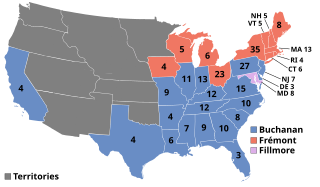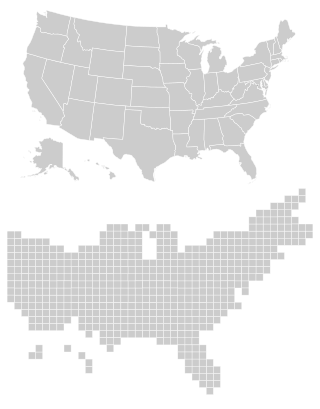
The Declaration of Independence, formally titled The unanimous Declaration of the thirteen united States of America, is the founding document of the United States. On July 4, 1776, it was adopted unanimously by the 56 delegates to the Second Continental Congress, who had convened at the Pennsylvania State House, later renamed Independence Hall, in the colonial era capital of Philadelphia. The declaration explains to the world why the Thirteen Colonies regarded themselves as independent sovereign states no longer subject to British colonial rule.

The 1848 United States presidential election was the 16th quadrennial presidential election, held on Tuesday, November 7, 1848. In the aftermath of the Mexican–American War, General Zachary Taylor of the Whig Party defeated Senator Lewis Cass of the Democratic Party.

The 1856 United States presidential election was the 18th quadrennial presidential election, held on Tuesday, November 4, 1856. In a three-way election, Democrat James Buchanan defeated Republican nominee John C. Frémont and Know Nothing nominee Millard Fillmore. The main issue was the expansion of slavery as facilitated by the Kansas–Nebraska Act of 1854. Buchanan defeated President Franklin Pierce at the 1856 Democratic National Convention for the nomination. Pierce had become widely unpopular in the North because of his support for the pro-slavery faction in the ongoing civil war in territorial Kansas, and Buchanan, a former Secretary of State, had avoided the divisive debates over the Kansas–Nebraska Act by being in Europe as the Ambassador to the United Kingdom.

The 1860 United States presidential election was the 19th quadrennial presidential election, held on Tuesday, November 6, 1860. In a four-way contest, the Republican Party ticket of Abraham Lincoln and Hannibal Hamlin won a national popular plurality, a popular majority in the North where states already had abolished slavery, and a national electoral majority comprising only Northern electoral votes. Lincoln's election thus served as the main catalyst of the states that would become the Confederacy seceding from the Union. This marked the first time that a Republican was elected president. It was also the first presidential election in which both major party candidates were registered in the same home state; the others have been in 1904, 1920, 1940, 1944, and 2016.

The 1884 United States presidential election was the 25th quadrennial presidential election, held on Tuesday, November 4, 1884. In the election, Governor Grover Cleveland of New York defeated Republican James G. Blaine of Maine. It was set apart by unpleasant mudslinging and shameful personal allegations that eclipsed substantive issues, such as civil administration change. Cleveland was the first Democrat elected president of the United States since James Buchanan in 1856, the first to hold office since Andrew Johnson left the White House in 1869, and the last to hold office until Woodrow Wilson, who began his first term in 1913. For this reason, 1884 is a significant election in U.S. political history, marking an interruption in the era when Republicans largely controlled the presidency between Reconstruction and the Great Depression.

The 1984 United States presidential election was the 50th quadrennial presidential election, held on Tuesday, November 6, 1984. Incumbent Republican President Ronald Reagan and his running mate, incumbent Vice President George H.W. Bush, were re-elected to a second term in a landslide. They defeated the Democratic ticket of former Vice President Walter Mondale and Geraldine Ferraro.

In the United States, the Electoral College is the group of presidential electors that is formed every four years for the sole purpose of voting for the president and vice president. The process is described in Article II of the U.S. Constitution. Each state appoints electors using legal procedures determined by its legislature, equal in number to its congressional delegation totaling 535 electors. A 1961 amendment granted the federal District of Columbia three electors. Of the current 538 electors, a simple majority of 270 or more electoral votes is required to elect the president and vice president. If no candidate achieves a majority there, a contingent election is held by the House of Representatives to elect the president and by the Senate to elect the vice president. Federal office holders, including senators and representatives, cannot be electors.

Direct democracy or pure democracy is a form of democracy in which the electorate decides on policy initiatives without elected representatives as proxies. This differs from the majority of currently established democracies, which are representative democracies. The theory and practice of direct democracy and participation as its common characteristic was the core of work of many theorists, philosophers, politicians, and social critics, among whom the most important are Jean Jacques Rousseau, John Stuart Mill, and G.D.H. Cole.
John R. Koza is a computer scientist and a former adjunct professor at Stanford University, most notable for his work in pioneering the use of genetic programming for the optimization of complex problems. Koza co-founded Scientific Games Corporation, a company which builds computer systems to run state lotteries in the United States. John Koza is also credited with being the creator of the 'scratch card' with the help of retail promotions specialist Daniel Bower.

The Prohibition Party is a political party in the United States known for its historic opposition to the sale or consumption of alcoholic beverages and as an integral part of the temperance movement. It is the oldest existing third party in the United States and the third-longest active party.

The Lincoln–Douglas debates were a series of seven debates between Abraham Lincoln, the Republican Party candidate for the United States Senate from Illinois, and incumbent Senator Stephen Douglas, the Democratic Party candidate. Until the Seventeenth Amendment to the United States Constitution, which provides that senators shall be elected by the people of their states, was ratified in 1913, senators were elected by their respective state legislatures, so Lincoln and Douglas were trying to win the votes of the Illinois General Assembly for their respective parties.

The Republican National Convention (RNC) is a series of presidential nominating conventions held every four years since 1856 by the Republican Party in the United States. They are administered by the Republican National Committee. The goal of the Republican National Convention is to officially nominate and confirm a candidate for president and vice president, adopt a comprehensive party platform and unify the party, as well as publicize and launch the fall campaign.

Birch Evans Bayh Jr. was an American Democratic Party politician who served as U.S. Senator from Indiana from 1963 to 1981. He was first elected to office in 1954, when he won election to the Indiana House of Representatives; in 1958, he was elected Speaker, the youngest person to hold that office in the state's history. In 1962, he ran for the U.S. Senate, narrowly defeating incumbent Republican Homer E. Capehart. Shortly after entering the Senate, he became Chairman of the Subcommittee on Constitutional Amendments, and in that role authored two constitutional amendments: the Twenty-fifth—which establishes procedures for an orderly transition of power in the case of the death, disability, or resignation of the President of the United States—and the Twenty-sixth, which lowered the voting age to 18 throughout the United States. He is the first person since James Madison and only non–Founding Father to have authored more than one constitutional amendment. Bayh also led unsuccessful efforts to ratify the Equal Rights Amendment and eliminate the Electoral College.
In political philosophy, the phrase consent of the governed refers to the idea that a government's legitimacy and moral right to use state power is justified and lawful only when consented to by the people or society over which that political power is exercised. This theory of consent is historically contrasted to the divine right of kings and had often been invoked against the legitimacy of colonialism. Article 21 of the United Nations' 1948 Universal Declaration of Human Rights states that "The will of the people shall be the basis of the authority of government". Consensus democracy is the application of consensus decision-making and supermajority to democracy.

The National Popular Vote Interstate Compact (NPVIC) is an agreement among a group of U.S. states and the District of Columbia to award all their electoral votes to whichever presidential ticket wins the overall popular vote in the 50 states and the District of Columbia. The compact is designed to ensure that the candidate who receives the most votes nationwide is elected president, and it would come into effect only when it would guarantee that outcome.
The Liberty Party was an abolitionist political party in the United States prior to the American Civil War. The party experienced its greatest activity during the 1840s, while remnants persisted as late as 1860. It supported James G. Birney in the presidential elections of 1840 and 1844. Others who attained prominence as leaders of the Liberty Party included Gerrit Smith, Salmon P. Chase, Henry Highland Garnet, Henry Bibb, and William Goodell. They attempted to work within the federal system created by the United States Constitution to diminish the political influence of the Slave Power and advance the cause of universal emancipation and an integrated, egalitarian society.

The election of the president and the vice president of the United States is an indirect election in which citizens of the United States who are registered to vote in one of the fifty U.S. states or in Washington, D.C., cast ballots not directly for those offices, but instead for members of the Electoral College. These electors then cast direct votes, known as electoral votes, for president, and for vice president. The candidate who receives an absolute majority of electoral votes is then elected to that office. If no candidate receives an absolute majority of the votes for president, the House of Representatives elects the president; likewise if no one receives an absolute majority of the votes for vice president, then the Senate elects the vice president.

2020 Colorado Proposition 113 was a ballot initiative approved by voters in Colorado as part of the 2020 United States elections. The proposition was to join the National Popular Vote Interstate Compact.
The 1853–54 Massachusetts gubernatorial election consisted of an initial popular held on November 14, 1853, which was followed by a legislative vote that was conducted on January 9, 1854, which elected Whig Party nominee Emory Washburn. The ultimate task of electing the governor had been placed before the Massachusetts General Court because no candidate received the majority of the vote required for a candidate to be elected through the popular election.















